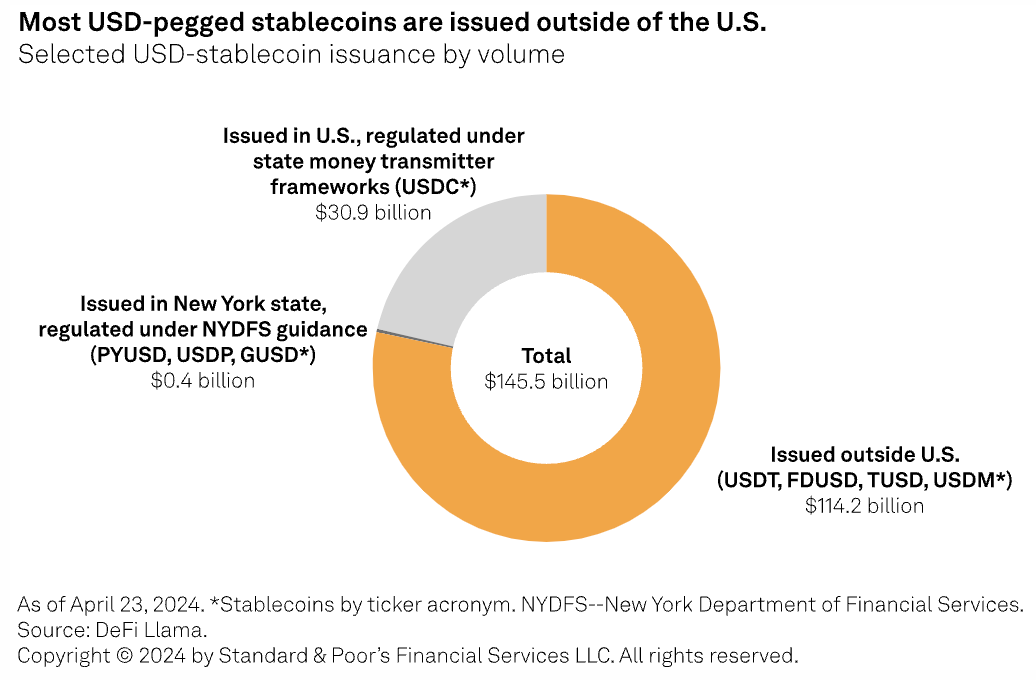 web3.0
web3.0
 S&P Global: USDT, the favorite bank of the latest stable currency law in the United States, may be weakened
S&P Global: USDT, the favorite bank of the latest stable currency law in the United States, may be weakened
S&P Global: USDT, the favorite bank of the latest stable currency law in the United States, may be weakened

This site (120btC.coM): Last week, U.S. Senators Kirsten Gillibrand and Cynthia Lummis proposed the latest stablecoin bill, the "Lummis-Gillibrand Payment Stablecoin Act," which intends to ban algorithms Stablecoins require issuers to support their tokens 1:1 and implement an anti-money laundering framework.
Regarding the possible impact of this bill, rating agency S&P Global stated that currently most U.S. dollar stablecoin issuers, including USDT, which has the largest market share, are not subject to U.S. regulations (as follows) picture).
However, this situation may change with the passage of the new bill. If the bill is finally established, it may prompt more banks to enter the stable currency market and affect Tether's dominant position.

Regulatory clarity will encourage banks to enter the stablecoin market
S&P Global pointed out that the bill authorizes national non-depository trust companies registered with the Federal Reserve ( Non-banks) can issue up to $10 billion in stablecoins, while depository institutions have no limit.
Thus, assuming the bill is approved and relevant banking regulations are followed, the new rules may limit the issuance of institutions without banking licenses to a maximum of $10 billion, thereby giving banks a competitive advantage.
S&P Global added that the bill is unlikely to have a significant impact on stablecoins already regulated by the New York Department of Financial Services (NYDFS), including PayPal USD, Gemini USD, and Paxos USD, as they are much lower than $10 billion threshold and otherwise largely under NYDFS guidance.
Tether’s dominance may weaken
But S&P Global stressed that if the bill passes, Tether’s dominance of the global stablecoin market may slow down because it is not registered in the United States the issuing entity.
“Tether is issued by a non-U.S. entity and is therefore not a payments stablecoin permitted by the proposed bill, meaning U.S. users cannot hold or trade Tether, which could reduce demand while boosting U.S.-issued stablecoins. .”
However, S&P Global also stated that Tether trading activities mainly occur in emerging markets outside the United States and are driven by general users and remittances.
Related provisions of the Lummis-Gillibrand Payment Stablecoin Act
According to S&PGlobal, the Lummis-Gillibrand Payment Stablecoin Act mainly stipulates the following matters:
Authorizes national non-depository trust companies (non-banks) registered with the Federal Reserve to issue stablecoins of up to $10 billion, while depository institutions have no threshold.
Transitional arrangements enable existing stablecoin issuers to continue operating pending new approvals.
Ban algorithmic stablecoins.
Reserve requirements include asset segregation, full guarantees covering all circulating stablecoins, and limiting reserve assets to cash, bank deposits, Treasury bills due within 90 days, and Treasury bills due within 7 days repurchase agreements and deposits with the Fed.
Monthly asset and regulatory breaches revealed.
Mandatory redemption of stablecoins within one working day.
FDIC Regulation and Resolution of Insolvent Stablecoin Issuers.
Clarifies that a custodian’s digital assets should be treated as off-balance sheet assets, just like other custody financial assets (overturning the SEC’s requirement that custodians report digital assets as on-balance sheet assets and assume liability corresponding liability requirements).
The above is the detailed content of S&P Global: USDT, the favorite bank of the latest stable currency law in the United States, may be weakened. For more information, please follow other related articles on the PHP Chinese website!

Hot AI Tools

Undresser.AI Undress
AI-powered app for creating realistic nude photos

AI Clothes Remover
Online AI tool for removing clothes from photos.

Undress AI Tool
Undress images for free

Clothoff.io
AI clothes remover

AI Hentai Generator
Generate AI Hentai for free.

Hot Article

Hot Tools

Notepad++7.3.1
Easy-to-use and free code editor

SublimeText3 Chinese version
Chinese version, very easy to use

Zend Studio 13.0.1
Powerful PHP integrated development environment

Dreamweaver CS6
Visual web development tools

SublimeText3 Mac version
God-level code editing software (SublimeText3)

Hot Topics
 The latest top ten global digital virtual currency trading platforms (authoritative ranking in 2025)
Mar 18, 2025 pm 01:12 PM
The latest top ten global digital virtual currency trading platforms (authoritative ranking in 2025)
Mar 18, 2025 pm 01:12 PM
The latest top ten global digital virtual currency trading platforms (authoritative ranking in 2025)
 Detailed tutorial on how to buy and sell Binance virtual currency
Mar 18, 2025 pm 01:36 PM
Detailed tutorial on how to buy and sell Binance virtual currency
Mar 18, 2025 pm 01:36 PM
Detailed tutorial on how to buy and sell Binance virtual currency
 Binance Virtual Currency Trading Platform APP download and installation link
Mar 18, 2025 pm 01:39 PM
Binance Virtual Currency Trading Platform APP download and installation link
Mar 18, 2025 pm 01:39 PM
Binance Virtual Currency Trading Platform APP download and installation link
 CAN coin issuance price and related introduction
Mar 20, 2025 pm 06:15 PM
CAN coin issuance price and related introduction
Mar 20, 2025 pm 06:15 PM
CAN coin issuance price and related introduction
 Binance binance web version entrance_Binance binance official web version use entrance address
Mar 18, 2025 pm 02:00 PM
Binance binance web version entrance_Binance binance official web version use entrance address
Mar 18, 2025 pm 02:00 PM
Binance binance web version entrance_Binance binance official web version use entrance address
 Simulation trading software for currency speculation
Mar 19, 2025 pm 04:24 PM
Simulation trading software for currency speculation
Mar 19, 2025 pm 04:24 PM
Simulation trading software for currency speculation
 Recommended top ten APPs in the digital currency exchange rankings (authoritative release in 2025)
Mar 18, 2025 pm 01:18 PM
Recommended top ten APPs in the digital currency exchange rankings (authoritative release in 2025)
Mar 18, 2025 pm 01:18 PM
Recommended top ten APPs in the digital currency exchange rankings (authoritative release in 2025)
 What is Tether? Which country is the founder of Tether? How to buy and sell Tether?
Mar 18, 2025 pm 01:24 PM
What is Tether? Which country is the founder of Tether? How to buy and sell Tether?
Mar 18, 2025 pm 01:24 PM
What is Tether? Which country is the founder of Tether? How to buy and sell Tether?




